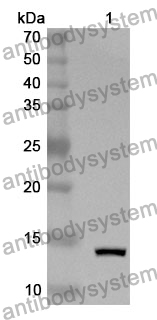Catalog No.
PHC14301
Species reactivity
Human
Host species
Rabbit
Isotype
IgG
Clonality
Polyclonal
Immunogen
E. coli - derived recombinant Human SERPING1 (Pro399-Ala500).
Tested applications
ELISA: 1:4000-1:8000, IHC: 1:50-1:100, WB: 1:1000-1:4000
Target
Serpin G1,SERPING1,C1Inh,C1 esterase inhibitor,Plasma protease C1 inhibitor,C1IN,C1 Inh,C1NH,C1-inhibiting factor
Concentration
1.15 mg/ml
Purification
Purified by antigen affinity column.
Accession
P05155
Applications
ELISA, IHC, WB
Form
Liquid
Storage buffer
0.01M PBS, pH 7.4, 50% Glycerol, 0.05% Proclin 300.
Stability and Storage
Use a manual defrost freezer and avoid repeated freeze thaw cycles. Store at 2 to 8°C for frequent use. Store at -20 to -80°C for twelve months from the date of receipt.
Human CD55 Expression and C1 Inhibition Partially Protect Gene-Edited Pig Red Blood Cells From Human Complement-Mediated Hemolysis In Vitro., PMID:40492338
Lanadelumab for prevention of attacks of non-histaminergic normal C1 inhibitor angioedema: results from the randomized, double-blind CASPIAN Study and CASPIAN open-label extension., PMID:40469312
Hereditary angioedema plasma proteomics following specific plasma kallikrein inhibition with lanadelumab., PMID:40417315
Angioedema without urticaria: Diagnosis and management., PMID:40380367
Adherence and persistence among patients with hereditary angioedema receiving long-term prophylaxis in the United States., PMID:40300843
16S rRNA and transcriptome analysis revealed the regulatory mechanism of Romboutsia lituseburensis on serum immunoglobulin levels in geese., PMID:40086254
Omics data integration analysis identified new biological insights into chronic antibody-mediated rejection (CAMR)., PMID:39979925
Indirect treatment comparison of lanadelumab and a C1-esterase inhibitor in pediatric patients with hereditary angioedema., PMID:39836016
Angioedema Due to Acquired C1-Inhibitor Deficiency Without Hematological Condition: A Multicenter French Cohort Study of 34 Patients., PMID:39756514
Idiopathic non-mast cell angioedema: Treatment insights from global experts., PMID:39741376
Hereditary angioedema in children: Review and practical perspective for clinical management., PMID:39655944
Hereditary Angioedema Attacks in Patients Receiving Long-Term Prophylaxis: A Systematic Review., PMID:39508959
Initial Experience of Long-Term Prophylaxis with Lanadelumab for Hereditary Angioedema in China: A Clinical Observation Study on Six Patients., PMID:39362190
Angioedema due to Acquired C1-Inhibitor Deficiency Associated With Monoclonal Gammopathies of Undetermined Significance Characteristics of a French National Cohort., PMID:39357560
Elevated C1s/C1-INH in serum and plasma of myasthenia gravis patients., PMID:39255718
Complete Description of the Three Pathways of the Complement System in a Series of 430 Patients with Rheumatoid Arthritis., PMID:39125933
Structural basis for the inhibition of βFXIIa by garadacimab., PMID:39059382
Familial aggregation of diffuse cutaneous systemic sclerosis: Interplay of C1r gene defect, susceptible HLA haplotype and autoantibodies., PMID:38923752
Identifying hub genes in response to ustekinumab and the impact of ustekinumab treatment on fibrosis in Crohn's disease., PMID:38840917
New Therapies for Type 1 and Type 2 Hereditary Angioedema., PMID:38819650
A quantitative systems pharmacology model of plasma kallikrein-kinin system dysregulation in hereditary angioedema., PMID:38734778
The future of therapeutic options for hereditary angioedema., PMID:38679158
Differentiated pattern of complement system activation between MOG-IgG-associated disease and AQP4-IgG-positive neuromyelitis optica spectrum disorder., PMID:38576611
The molecular determinants of classical pathway complement inhibition by OspEF-related proteins of Borrelia burgdorferi., PMID:38552741
Letter to the editor: network meta-analysis for indirect comparison of lanadelumab and berotralstat for the treatment of hereditary angioedema., PMID:38545965
The role of anticomplement therapy in the management of the kidney allograft., PMID:38485664
Repeated attacks of hereditary angioedema in pediatric female., PMID:38404177
Kallikrein inhibitors for angioedema: the progress of preclinical and early phase studies., PMID:38366937
Effect of lanadelumab on attack frequency and QoL in Japanese patients with hereditary angioedema: Report of five cases., PMID:38268496
C1 esterase inhibitor-mediated immunosuppression in COVID-19: Friend or foe?, PMID:38013973
Efficacy and Safety of Rituximab-Based Treatments in Angioedema With Acquired C1-Inhibitor Deficiency., PMID:37844846
Evaluation of the safety and effectiveness of berotralstat for patients with hereditary angioedema: Report of six cases., PMID:37721445
Patient-level indirect treatment comparison of lanadelumab versus pdC1-INH i.v. in hereditary angioedema patients: PATCH study., PMID:37641968
Efficacy and safety of lanadelumab in Japanese patients with hereditary angioedema: A phase 3 multicenter, open-label study., PMID:37574953
Citrullination of C1-inhibitor as a mechanism of impaired complement regulation in rheumatoid arthritis., PMID:37426666
Healthcare utilization of patients with hereditary angioedema treated with lanadelumab and subcutaneous C1-inhibitor concentrate., PMID:37328263
C1-inhibitor/C1-inhibitor antibody complexes in acquired angioedema due to C1-inhibitor deficiency., PMID:36726161
Lanadelumab for the prevention of hereditary angioedema attacks: A real-world UK audit., PMID:36510404
Efficacy of lanadelumab in angioedema due to acquired C1 inhibitor deficiency., PMID:36379410
Outer surface lipoproteins from the Lyme disease spirochete exploit the molecular switch mechanism of the complement protease C1s., PMID:36183830
Acquired angioedema: an unusual presentation of haematological malignancy., PMID:36123007
Longitudinal experience with treatment of acquired angioedema using tranexamic acid., PMID:36065111
Targeting thromboinflammation in COVID-19 - A narrative review of the potential of C1 inhibitor to prevent disease progression., PMID:36030710
Autoantibodies against Complement Classical Pathway Components C1q, C1r, C1s and C1-Inh in Patients with Lupus Nephritis., PMID:36012546
C1-inhibitor influence on platelet activation by thrombin receptors agonists., PMID:35996317
Real World treatment patterns of hereditary angioedema with lanadelumab in Germany: A prescription data analysis., PMID:35913113
Therapeutic monoclonal antibodies with a focus on hereditary angioedema., PMID:35787344
The effects of exercise on complement system proteins in humans: a systematic scoping review., PMID:35452398
Overview of SERPING1 Variations Identified in Hungarian Patients With Hereditary Angioedema., PMID:35386643

